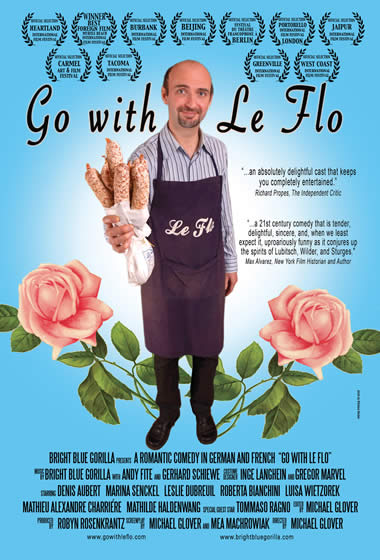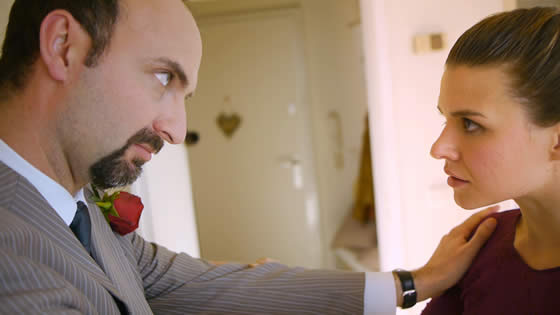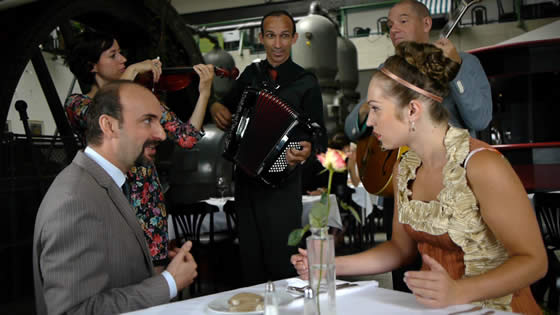 Florian is half-German, half-French and owns “Le Flo” – a French delicatessen in Berlin that specializes in salami. Go With Le Flo explores what true love is, with plenty of twists and turns (some on a vespa).
Florian is half-German, half-French and owns “Le Flo” – a French delicatessen in Berlin that specializes in salami. Go With Le Flo explores what true love is, with plenty of twists and turns (some on a vespa).
The romantic comedy was shot in Berlin by the award winning film-team (and music group), Bright Blue Gorilla. Go with Le Flo is an international labor of love with cast & crew from 20 different countries, starring fresh new faces, many from the legendary Bertolt Brecht theater, Berliner Ensemble.
Go With Le Flo is written and directed by Michael Glover and produced by Robyn Rosenkrantz.
Bijan Tehrani: In Go With Le Flo you are making a romantic comedy, a genre that is a bit tricky at the moment because of the failure of Hollywood romantic comedies. Your film goes to the traditional roots of romantic comedies and I think that this factor will bolster the success of your film. What first sparked your interest in this project?
Michael Glover: Thanks for that comment, you can see what I am doing because you know film, but the problem is that modern studio are trying to be edgy and dark, and I think they are missing the point. Robyn and I are performers—that is how we started—so the audience to me is always the one that I care about. I don’t care about other people’s opinions necessarily, but what the audience reacts to or doesn’t: that has always been what is most important to me being a live performer. So in conversations with audiences around the world, I’ve heard they are pretty much done with edgy, dark, gross, etc. They want a story, they want emotion, they want something that they can feel and not just be shocked by—they are not interested in being shocked anymore, and I think that the studio systems are behind. The studios and the major movies are like dinosaurs, they move really slowly into the next thing. Independents can be quicker, because we are smaller and have a bit more freedom. What I am trying to go back to, as you just commented on, is the roots of it. I am going back to Billy Wilder and the classic storytelling style that they had in the 20’s & 30’s; those are the kinds of films that I watch the most. Those are the films that I grew up on and that I learned from, so it just seeps into my work and I am happy to say that the modern audiences have been just beautifully supportive and complimentary of this form. The funny thing is that when you are doing an older style that people don’t remember, they tend to think of it as something new and fresh, but to be honest with you I am doing Lubitsch.
BT: Go With Le Flo reminds me of a lot of 60’s comedies form Italy, France, and all of those countries that stuck to the traditional romantic comedies that were fun with a good story.
MG: I think that they were free spirited. One of the problems that they have in the modern system is the pressure of money; the pressure of a lot of money and a lot of people—who are not necessarily very nice—that are invested in your movie. So there is this pressure lingering over your head of “you better make it good or you’re in trouble!”. That takes a lot of the fun out of it. With us we are doing very low budget stuff with people that want to do it. I don’t have to convince anyone to come to my set. If you ever watch our making-of stuff that we shoot, you’ll see that the atmosphere on the set is just fun. They are all doing great work because they are in a great mood and the way we try to run the set is organized and calm, but as effective as possible. I think that the French and Italian films kept it simple. Like Renee Claire, he would just do a few takes and that created a beautiful atmosphere on set and it made it fun, and that is what we are trying to do.
BT: So many films today rely on special and visual effects, which can actually take away from the storytelling.
MG: You mentioned the 60’s a minute ago, and one of my favorite Americans is Blake Edwards. Blake is basically doing the French Farce, but he was copying the French sort of; the way he shot things was so simple compared to the way it is now—his set up and his establishing shots and so on. I do like some of the modern movies, but sometimes they get so lost in the technique. For example, if they are showing an establishing shot of a building and there is a person inside the office working, instead of showing the outside of the building and then cutting to the guy inside the building—very simple—they now crane into the window and down the hall and these crazy trick shots that they put in everything because they think the audience does not have an attention span. They have to justify the money they are spending on these things so they make these ridiculous shots that pull people out of the story. I think independents are forced into doing with a more simple approach to storytelling, but the audiences will like it as long as it is a good story.
 BT: From some of the rumors I heard, you had a very low budget for this film. This is good news for independent filmmakers.
BT: From some of the rumors I heard, you had a very low budget for this film. This is good news for independent filmmakers.
MG: Like I said, what I have discovered is that if you have a good story and you are able to explain your vision to other people, they will want to be a part of it. We had 200 people working on this film, and every one of them was working in this artistic bubble. You probably remember those Andy Hardy films, where Mickey Rooney would always say “Hey Guys, let’s put on a show!” because they are trying to raise money for Aunt Edna’s kidney operation or something. They all pitch in with different essentials and they would put a show together with whatever they have. That is what we do, and we find that we have a lot of people with great attitudes who want to come together and make art.
BT: How did you come up with the story of Go With Le Flo?
MG: Well originally I had written an English-language romantic comedy that takes place in Los Angeles and I was getting ready to do that here, and a director named Michael Schultz—a good friend of mine who directed the iconic film “Car Wash”— was here and he made an off-handed comment about me shooting in Berlin since we had connections in Europe, and it was more fun and easier to shoot in Berlin on a low budget. Sure enough, I made some calls and we went to Germany and we wrote it to fit the scene there. I collaborated on the script with a German co-writer and we crafted it into German and French.
BT: Very interesting because this makes it sort of an international film, while also having a local market. What are your ideas for distributing this film?
MG: That is what people say and I know in general it is. We are a band first; for 24 years we have been in a band performing around Europe, so we had 24 years to create a fan-base in Europe to give our hearts to and to sell our art to, basically. So when we started making movies about 7 years ago, the first movie we made was an experiment and we were able to sell it to our fans in Europe and play it in our cinemas over there because we knew that so many people were in the touring scene. We basically took our movies on tour like a band touring with a record, so we were able to make a small profit on each movie—not millions, but enough to make another  movie. We don’t spend that much on a movie, so we don’t need to make that much. We would make enough on a movie to make another movie and so we did that four times, and then “Go with the Flow” was made. The quality has been going up for every movie, and this one is getting international attention. Another very interesting development is underway: I can’t announce it yet, but we recently began making arrangements for a television and cable deal.
movie. We don’t spend that much on a movie, so we don’t need to make that much. We would make enough on a movie to make another movie and so we did that four times, and then “Go with the Flow” was made. The quality has been going up for every movie, and this one is getting international attention. Another very interesting development is underway: I can’t announce it yet, but we recently began making arrangements for a television and cable deal.
BT: Do you have any plans for a theatrical release of the film?
MG: We have always taken it on the road with us in Europe, primarily going from cinema to cinema with this film. We know that we are doing two weeks in Los Angeles, and we plan to do a cinema run in New York. After that, we are going to Europe to run it in some cinemas and also some summer concert screening series, so it is going to be a decent release and that is just by ourselves.
BT: How did you go about casting Go With Le Flo?
MG: The casting was a blessing because our choice for the lead actress was from the Berlin Ensemble. She plays the character of Jennie, and when she was cast, all of the other members of that theater group came forward and said, “Hey! We want to be in this!” So we ended up with 11 actors from the Berto Brecht ensemble who are all incredibly good actors. That made it really easy for me to work with this cast, and any other roles that we needed to fill, they would just call someone they knew to fill the holes and we would audition them. One other thing about casting—since we were talking about the state of making movies; the casting process in the modern day movie and television system is ridiculous. They have to show why they charge money to cast the films, so any decent casting agent would know 5 or 6 people that were perfect for the role, but they have to audition hundreds of people just to show the studio that they are trying to cast the role. When we casted this film, we didn’t see hundreds, we only saw a few and then we would ask the people that we casted who they knew that they thought would be good for other roles, and we would take the opinions of the people we trust.
BT: Your crew has definitely shown that a great story can be told on film no matter how limited the budget is!
*Go With Le Flo will be released day and date with its world theatrical premiere on Eurocinema On Demand, available to over 35 million cable and satellite homes, and online on eurocinema.com throughout the United States.
To by tickests for theatrical release of Go With Le Flo click here http://www.brownpapertickets.com/producerevent/537914

